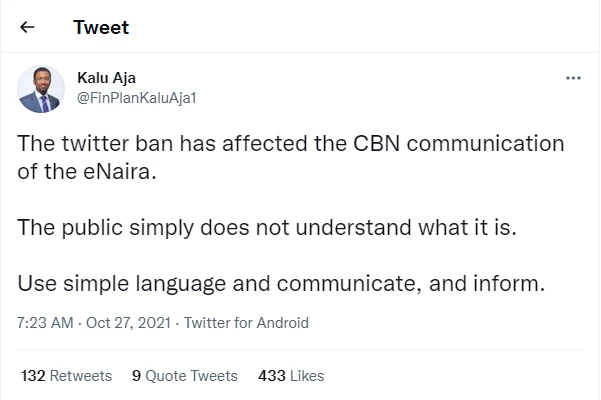It’s a been three days since Nigeria officially launched its much anticipated digital currency, the eNaira. And as you can expect, there has been lots of conversations around the subject. On Twitter (which is currently banned in the West African country), eNaira has been among the trending topics since Monday. The different opinions we’ve seen so far come from both places of excitement, skepticism and uncertainty.
“I really want more sensible people to review this eNaira policy from the point of view of property rights. We don’t want another land use act in disguise but for money. Things with far-reaching impact like this should be debated and tested sufficiently before they become fiat,” wrote Victor Osaretin Asemota, a prominent entrepreneur and venture capitalist.
About the eNaira
As you probably already know by now, Nigeria is the first country in Africa and one of the very few in the world to launch a digital currency. Officials in the country believe that the launch of the digital currency would encourage financial inclusion, boost remittance of hard currency into the country and ultimately help the country’s economy to grow.
A challenging few days for the eNaira
So far, it hasn’t been a very easy ride for the digital currency. The Central Bank of Nigeria (CBN), had on Monday rolled out two mobile apps for the digital currency —eNaira Speed Wallet and eNaira Merchant Wallet. Although the speed wallet app recorded more than a hundred thousand downloads on Google Play Store as at Wednesday October 27, the reviews were so poor to the extent it was eventually removed, in line with Google’s guidelines.
In the meantime, the second app is currently at risk of being removed as well because of poor ratings. An example of the poor reviews is this one by Abdulrazak Rogo which says: “Can’t sign up, after providing all the information for registration. The app keeps loading for more than 30 minutes without any response. I tried again but the same problem.”
Well, we wish the eNaira some respite from all its challenges. Hopefully, it will find its balance soon and flourish. In the meantime, we need to make a quick clarification. See below.

The eNaira is not a cryptocurrency
One of the misconceptions that people have about the eNaira is that it is a cryptocurrency. But it is not. Unfortunately, as investment expert, Kalu Aja pointed out, the CBN hasn’t really done enough to communicate what the eNaira is really about. As a result, a lot of people do not quite understand it, even as misinformation becomes the order of the day.

In view of this misconception, here are some clarifications courtesy of Babatunde Akin Moses, the founder and CEO of Lagos-based fintech startup Sycamore.NG.
- 1. The eNaira is a digital currency, not a cryptocurrency.
- 2. Although both digital currencies and cryptocurrencies are both based on technology, a digital currency only becomes a cryptocurrency when it is encrypted. And that’s not the case for the eNaira.
- 3. The eNaira is not going to be as volatile as Bitcoin for example. This is because the eNaira is going to be pegged against the value of the actual naira.
- 4. The eNaira is centralised in the sense that it is owned and managed by the CBN. This is unlike cryptocurrencies which are based on decentralised ledger.
- 5. We know that crypto mining consumes a lot of electricity. This is one of the worries some people have expressed due to their misconception of the eNaira as a crypto asset. But then again, the eNaira is not a cryptocurrency so you don’t have to worry about power consumption when using it.
